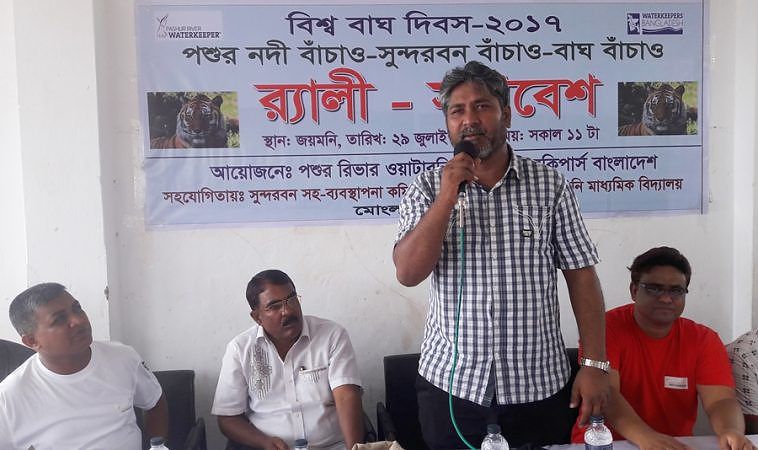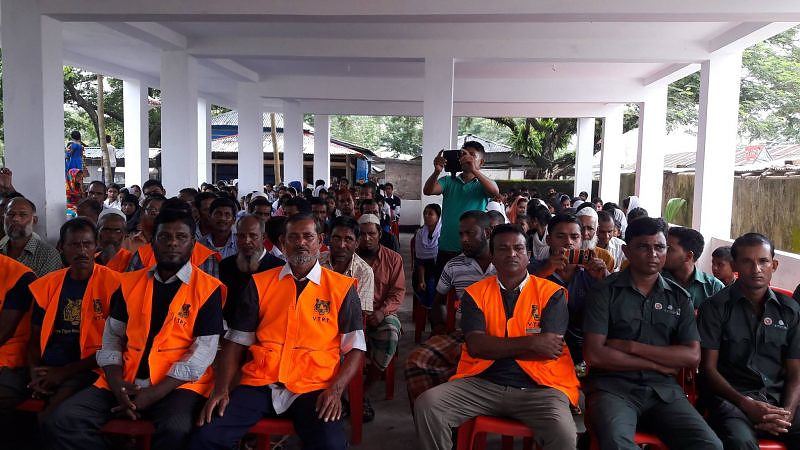
Reposted with permission from Waterkeepers Bangladesh Blog
Waterkeepers Bangladesh and Pashur River Waterkeeper honored International Tiger Day on July 29, 2017.
The world’s largest mangrove forest, the Sundarbans, is situated in the coastal region of Bay of Bengal. It is one of the natural wonders of the world. It was recognized as a UNESCO World Heritage Site in 1997. The Sundarbans is an important habitat for the endangered Royal Bengal Tiger, a rare species in the world. Tigers have become the most vulnerable species in the Sundarbans due to poaching. Bangladesh has only a little more than 100 Royal Bengal Tigers living in the Sundarbans forest. According to a forestry survey, the numbers have declined from 440. Of all wild tigers, 97% have disappeared in the last century, with only around 3,000 left alive. Tigers are on the brink of extinction and International Tiger Day aims to bring attention to this fact and try to halt their decline. This year, like every year, Waterkeepers Bangladesh and Pashur River Waterkeeper jointly observed the International Tiger Day-2017 on 29th of July.
Waterkeeper Bangladesh and Pashur River Waterkeeper organized a short consultative meeting and decorated rally at Joymoni, Mongla adjacent to the Sundarbans on that day. The main motto of this public gathering was to save the endangered tigers from extinction as well as the Sundarbans. Carrying the banner with the Slogan- ‘Save Pashur River, Save the Sundarbans and Save Tigers,’ the rally marched towards the city from Joymoni Primary School. People from all walks of life including the school children, fishermen, forest workers, honey collectors, boatmen, environmental activists and local government authorities joined the rally to support the cause.
The event was presided over by Md. Noor Alam Sheikh, Pashur River Waterkeeper. Sharif Jamil, coordinator of Waterkeepers Bangladesh, played the role of keynote speaker. Sharif Jamil said in his speech, ‘Today is International Tiger Day. The Sundarbans of Bangladesh is known as the habitat of tigers including some countries of the world, which is a matter of pride for us. It is not possible to protect these resources if the people residing around the Pashur River and the Sundarbans do not understand the value of their ownership. The new generation of students who are studying in the school should be encouraged to protect the Sundarbans and Tigers. Because each student represents a family. A problem cannot be solved unless the source of the problem is discovered. Corrupted mindsets can never save the Sundarbans and its tigers.”
Many individuals from local schools, universities, NGOs and local government authority shared their valuable opinions to protect the tigers and the Sundarbans’ ecosystem. A speaker at the meeting said, “Everyone has to assist to protect the Pashur River and the Sundarbans. We all should protect the natural habitat of our national animal, the Royal Bengal tiger. The government must take necessary measures to prevent unplanned industrialization in order to save the Mongla people from river erosion. Unless we have an independent, dedicated anti-poaching unit, the future is not bright for the tigers in Bangladesh.”

